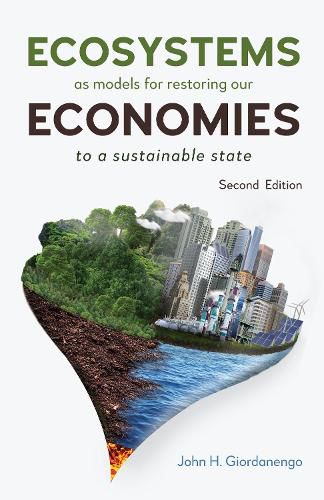Readings Newsletter
Become a Readings Member to make your shopping experience even easier.
Sign in or sign up for free!
You’re not far away from qualifying for FREE standard shipping within Australia
You’ve qualified for FREE standard shipping within Australia
The cart is loading…






Emerging from the fields of ecological restoration and economics, this interdisciplinary book delivers a clear path to restoring our economies in a way that speaks in a universal language to policy makers, business owners, academics and the general public.
Traditional approaches to sustainability focus on the social, environmental and economic pillars of an economy. However, little attention is paid to the foundations upon which those pillars rest. Those foundations a system's foundational components have been ignored for good reason; we have lacked a comprehensive understanding of what they are and how they interact. Cross-cutting research between ecological and economic systems reveals three foundational components (i.e., drivers, long levers) of highly resilient and productive economies and ecosystems. The identification and management of those components is perhaps the most important insight to resolving growing tensions between society, nature and the global market economy.
Chronic social, environmental and economic externalities have defined the past seven hundred years of evolving global market capitalism. In highly developed countries such as the United States, the most recent global trade patterns have been accompanied by flat real wages, flat productivity growth, a growing wealth gap, and a balance tilted largely toward lower resilience and resistance to global economic turmoil. Most of these externalities and poor economic performance stem from our mismanagement of diversity, energy and trade. Restoring the balance of these components does not jeopardise our quality of life and security, but holds promise that our most important social, environmental and economic values will be ensured. The scale at which diversity, energy and trade must be managed is justified by self-regulating ecosystems such as jungles, prairies and pine-oak forests. That scale is not global, and it is not hyper local. The economic and ecological rationale agree that the scale of a sustainable economy the natural geography of humans is regional. The closing chapters outline earth's ancient wisdom for restoring our economies, as illuminated by humanities shared experience in ecological restoration.
The process of ecosystem recovery following disturbance (i.e., succession) is one such beacon of wisdom. Unwittingly, developed economies such as the US mange succession to concentrate wealth into fewer hands, while degrading productive capacity and resilience. Following nature's lead economic policies can readily move the succession dial toward the productive and diverse center, where wealth and resources are recirculated quickly, opportunities are continually created, and resilience and resistance are fortified a stout shield in the face of global economic turmoil. Turmoil that is predicted to only increase in the 21st century. Economic restoration is not only possible it is our humanitarian duty.
$9.00 standard shipping within Australia
FREE standard shipping within Australia for orders over $100.00
Express & International shipping calculated at checkout
Emerging from the fields of ecological restoration and economics, this interdisciplinary book delivers a clear path to restoring our economies in a way that speaks in a universal language to policy makers, business owners, academics and the general public.
Traditional approaches to sustainability focus on the social, environmental and economic pillars of an economy. However, little attention is paid to the foundations upon which those pillars rest. Those foundations a system's foundational components have been ignored for good reason; we have lacked a comprehensive understanding of what they are and how they interact. Cross-cutting research between ecological and economic systems reveals three foundational components (i.e., drivers, long levers) of highly resilient and productive economies and ecosystems. The identification and management of those components is perhaps the most important insight to resolving growing tensions between society, nature and the global market economy.
Chronic social, environmental and economic externalities have defined the past seven hundred years of evolving global market capitalism. In highly developed countries such as the United States, the most recent global trade patterns have been accompanied by flat real wages, flat productivity growth, a growing wealth gap, and a balance tilted largely toward lower resilience and resistance to global economic turmoil. Most of these externalities and poor economic performance stem from our mismanagement of diversity, energy and trade. Restoring the balance of these components does not jeopardise our quality of life and security, but holds promise that our most important social, environmental and economic values will be ensured. The scale at which diversity, energy and trade must be managed is justified by self-regulating ecosystems such as jungles, prairies and pine-oak forests. That scale is not global, and it is not hyper local. The economic and ecological rationale agree that the scale of a sustainable economy the natural geography of humans is regional. The closing chapters outline earth's ancient wisdom for restoring our economies, as illuminated by humanities shared experience in ecological restoration.
The process of ecosystem recovery following disturbance (i.e., succession) is one such beacon of wisdom. Unwittingly, developed economies such as the US mange succession to concentrate wealth into fewer hands, while degrading productive capacity and resilience. Following nature's lead economic policies can readily move the succession dial toward the productive and diverse center, where wealth and resources are recirculated quickly, opportunities are continually created, and resilience and resistance are fortified a stout shield in the face of global economic turmoil. Turmoil that is predicted to only increase in the 21st century. Economic restoration is not only possible it is our humanitarian duty.